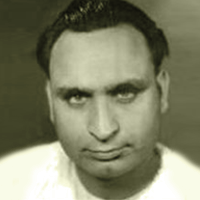Profile of Qamar Jalalabadi
Om Prakash Bhandari popularly known as Qamar Jalalabadi, began his life on March 9th, 1917 in Jalalabad (now in Pakistan) as. His father, Lala Harjasrai Bhandari, was a storekeeper for granaries in the British Raj for few years and later took care of the farms and family property in Jalalabad. Om Prakash started writing poetry at an early age though there was no legacy of music or poetry in the family.He completed his Matriculation from Kapurthala in Punjab and started a career in journalism in Lahore. He worked for papers like Daily Milap, Daily Pratap, Nirala, and Star Shahkaar. He also started gaining popularity as a shaayar. As a result he was recruited by Pancholi Arts Pictures in 1942 to write lyrics for some of the songs of their film Zamindaar whose music was being given by Ghulam Haider sahib. He wrote 4 – 5 songs for this movie and two of them were in partnership with Behzad Lakhnavi. Of these, “Duniya Mein Ghareebon Ko Aaraam Nahin Milta…” and “Mere Haal Par Bebasi Ro Rahi Hai…”, both sung by Shamshad Begum, gained a lot of popularity. This was followed by Sahara and Pagli in 1943 where again a couple of songs became reasonably popular.
In 1944 he moved to Pune from Lahore and started working for Prabhat Film Company. Here he wrote songs for films like Ramshastri , Chaand (1944), Lakharani (1945), Gokul (1946). All of these were films where he was the solo lyricist. Of these, Chaand is particularly noteworthy. It had 11 songs in varying moods ranging from comic to theatrical to romantic to pathos ridden to patriotic and many of these became particularly popular. With Chaand, he also started writing Dialogues for films, a cycle that was to repeat for dozens of films. It should be safe to say that this was the first film that gave a glimpse into the wide range of his talent as a writer.
In 1946 he moved to Bombay with erstwhile partner in Prabhat, Baburao Pai, and started working for his company “Famous Pictures”. This was a turning point in Qamar Sahib’s career. He wrote songs for films like Nargis (1946), Pyar Ki Jeet (1948) and Badi Bahan (1949) for Famous Pictures. In parallel he also worked in some “Filmistan” ventures like Eight Days (1946), Leela, Saajan, Sindoor (1947), Shaheed (1948), Shabnam (1949). There were also other outside ventures like Mirza Sahiban (1947), and Bazar (1949). Popularity of songs like “Main Kaise Kahoon Toote Hue Dil Ki Kahaani…”, “O Door Jaane Waale, Vaada Na Bhool Jaana…”, “Ik Dil Ke Tukde Hazaar Hue…”, “Koi Duniya Mein Hamaari Tarah Barbaad Na Ho…”, “Wo Paas Rahen Ya Door Rahen…”, “Bigadi Banaanewale Bigdi Banaa De…”, “Qismat Mein Bichhadnaa Thaa…”, “Aaja Tujhe Afsaana Judaaii Ka Sunaayen…”, “Rut Rangeeli Hai…”, “Kya Yahi Tera Pyaar Tha…”, “Saajan Ki Galiyan Chood Chale…”established Qamar Sahib firmly as a top-line lyricist. This was the beginning of the most charmed period of his career.
The trend continued into fifties and sixties with songs in soundtracks like Gauna, Meena Baazaar , Chhoti Bhabhi, (1950), Sanam, Sarkar, Shabistaan (1951), Anjaam (1952), Aansoo, Farmaaish, Mashooka (1953), Pahli Tareekh, Waaris (1954), Adl-e-Jehangir (1955), Rajdhani (1956), Changez Khan, Jalti Nishani (1957), Howrah Bridge, Phagun, Ragini (1958), Basant, Kalpana, Chhaliya (1960), Apsara, Passport, Pyaase Panchhii (1961), Pyar Ki Jeet (yes a second one ), Naag Devta (1962), Rustom-Sohrab, Kahin Pyar Na Ho Jaaye, Shikari, Shaheed Bhagat Singh, Yeh Dil Kisko Doon (1963), Himalaya Ki God Mein, Johar Mehmood In Goa (1965), Hum Kahan Jaa Rahe Hain, Preet Na Jaane Reet, Upkaar (1967), Mahua (1969), Aansoo Aur Muskaan (1970). A sampling of songs leads us to gems like “Agar Dil Kisi Par Lutaaya Na Hota…”, “Ye Teri Kahaani Hai…”, “ Hothon Pe Kisi Ka Naam…”, “Bedard Shikari…”, “Kabhi Aise Mein Aa Jaao…”, “Hai Ye Mausam-e-Bahaar…”, “Sun Mere Saajnaa Re…”, “Aap Ne Chheen Liya Dil…”, “Dil Mein Hamaare Aag Lagaakar Chale Gaye..”, “Din Hai Suhana Aaj Pehli Taarikh Hai…”, “Raahi Matwaale…”, “Chand Sitare Karte Ishaare…”, “Ae Meri Zindagi Tujhe Dhoondhoo Kahaan…”, “Mohabbat Zinda Rehti Hai…”, “Rooth Ke Tum To Chal Diye…”, “Aaiye Meherbaan Baithiye Jaan-e-Jaan…”, “Mera Naam Chin Chin Choo..”, “Ek Pardesi Mera Dil Le Gaya…”, “Dum Dum Diga Diga Mausam Bhiga Bhiga…”, “Mere Toote Hue Dil Se Koi To Aaj Ye Pooche…”, “Teri Raahon Mein Khade Hain…”, “Tu Hai Mera Prem Devta…”, “Aji Surat Ho To Aisi Ho…”, “Phir Tumhari Yaad Aayi Ae Sanam…”, “Yeh Kaisi Ajab Daastaan Ho Gayi…”, “Yeh Rangin Mehfil Gulabi Gulabi…”, “Main To Ek Khwab Hoon Is Khwab Se Tu Pyar Na Kar…”, “Aakhiyon Ka Noor Hai Tu…”, “Deewanon Se Ye Mat Poocho…”, “Donon Ne Kiya Tha Pyar Magar…”, “Guni Jano Bhakt Jano…” etc.
After living a full life, Qamar Sahib succumbed to old age and Diabetes on January 9th, 2003 at the age of 86. Though he is no more, he has left behind a rich legacy of unforgettable songs that will keep him alive in the memories of Hindi Film Music lovers forever.
USEFUL LINKS : | https://en.wikipedia.org/wiki/Qamar_Jalalabadi | http://www.qamarjalalabadi.com/

